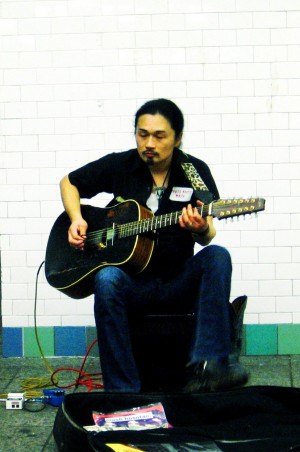As I travel around I get a bit nostalgic for my NYC busking days -although not in winter ; ) Brazilian busker Zooga Malaga is featured in this beautiful video story. Thought I'd share it. Watching it made me homesick.
Aurel and Elo tribute, victims of Paris massacre
Aurelie de Peretti and Elodie Sappy, friends of mine from St. Tropez, France, visited me in NYC in November 2013. I showed them around the city and they especially enjoyed the subway music we found along the way.
Aurel and Elo were in Paris on November 13, 2015 attending a concert of Eagles Of Death Metal at the Bataclan concert hall. Aurel was killed, and Elo was gravely wounded. As of this post she is in a Parisian hospital. My heart goes out to the families of these dear women. They loved life and music
May the death of Aurel and the injuries of Elo not be turned into fear. I found this clip in my archives and am so happy to see them once again filled with light, love and wonderment. As Aurel exclaims after hearing the brass duo perform on the platform at Broadway and Lafayette, C’est magique which needs no translation.
Love and Light to us all. I was lucky enough to have know Aurel for the short time I did, and I hope one day to visit Elo and give her a huge hug of love and support.
Music heals.
Through the Turnstile: Subway Performing in NYC
May 2012: This month's guest blogger is from writer Laura Hankin
Laura Hankin grew up in Washington DC, but since 2010 has been enjoying a passionate, live-in relationship with New York City. She graduated from Princeton University with a major in psychology and a minor in theater. In addition to GALO, she writes regularly for The Artist’s Forum, and has been published in The Washington Post and The Daily Princetonian. As a performer, she has toured the United States in a musical for children, acted off-Broadway, and sung back-up for The Yeah Yeah Yeah’s Karen O. She's not quite sure where she'll end up, but she hopes to spend more time talking to interesting people and passing on their stories to the world. In her free time, she attempts to teach herself how to play guitar, bakes a lot of pumpkin chocolate chip cookies, and likes to read as much as possible.
from GaloMagazine.com Global Arts Laid Out, an interesting article on subway performers
Featured in GaloMagazine.com Global Arts Laid Out
By Laura Hankin:

One cold morning in 2007, a man stood inside the entrance of a Washington, D.C. subway station and played the violin. Occasionally, the people walking by tossed money into his violin case or, in extremely rare instances, stopped for a minute to listen. Mostly, they kept going, eyes fixed anywhere but on him. Playing for a mobile audience of 1,000 people over the course of 45 minutes, the violinist made $37. That violinist was Joshua Bell, widely regarded as one of America’s best and most famous classical music interpreters.
The now-notorious experiment, conducted by The Washington Post to determine whether a person’s innate appreciation for beauty could override their rush hour routine, called attention to the plight of subway buskers. Five years later, in New York City, these performers are a familiar sight to anyone who rides the train. Passing from one track to another, commuters might find themselves caught in the glorious cacophony that can arise from the exertions of a single drummer, his beats echoing off the walls. Doo-wop groups set up shop mere feet from where the trains pull in. Most days of the week, a mariachi band executes a delicate balancing act, the members playing their way through the moving MTA cars. A guy with a didgeridoo confounds neophytes to Australian aboriginal music with the duck-like sounds he produces. But in a world where people increasingly glue themselves to the phones in their hands and the music pounding from their headphones, how do performers reach them, either to give them a transcendent musical experience or to convince them to drop a crumpled bill into a tip jar so that rent can be paid on time?
For some performers, the keys to a successful experience are straightforward. “I think Joshua Bell picked a stupid spot and the worst time,” says fellow violinist Filip Pogady, alluding to the fact that Bell played in a passageway during rush hour. “You need five minutes to convince people you’re good while they have to wait for the train.”
Pogady, who came from Slovakia to earn a Master’s degree at the Manhattan School of Music, initially started street performing for fun with friends. In the third year of his Master’s program, however, he realized that busking could be a powerful tool for exposure. “Everyone passes through the subway, people who wouldn’t normally get to hear you,” he says. Now, in addition to playing professional gigs and teaching violin, he performs frequently in stations, complex classical pieces emanating from his instrument with ease. He has come to know the stations where the money flows freely (“The East Side is just terrible,” while the best spots “are usually the touristy ones,” he says) and learned not to look directly at people as he plays, so he doesn’t make them uncomfortable. If a couple of people stop to listen, it’s easier to build a crowd drawn by the spectacle.
Ron Wingate, who has made singing and playing guitar in subway stations his primary job since 2001, jokes with the people standing on the platform with him, and high-fives children who drop money into his case. “I’ve gotten so comfortable with what I do,” he says, “and I’ve learned techniques so that, at the end of the night, I’m going to have some money, and the people who pass my way are going to have a good time.”
But even once performers learn the ropes, setbacks abound. A gulf of misunderstanding stretches between the police officers who patrol the NYC subways and the musicians who play there. Three different policemen, none of whom gave their names, maintained that the law forbids all performance in the subway, unless artists obtain a special permit. Buskers can apply for an audition with the city and, if deemed talented enough, they get to perform under a legitimizing banner in certain locations at set times every week. These policemen said they usually only gave warnings to banner-less musicians, but could arrest them if they wanted. Yet the section entitled “Entertaining on the Subway” on the New York Police Department (NYPD) Web site states that “artistic performances on transit facilities are permitted” as long as they abide by a laundry list of rules forbidding amplification, specifying the number of feet performers must stay from token booths, and so on. Police officers have ticketed Wingate multiple times over the past eleven years, even though his actions were not violating any of the laws listed on the Web site. He estimates that he has been to court ten times, always successfully fighting his way out of paying the tickets given by cops who were unfamiliar with the rules. Morgan O’Kane, whose banjo playing produces more sound than one would expect to come from just ten fingers, says, “I’m chased and harassed by police all the time. It has become part of the job,” although he has also had positive experiences with cops who bought the CDs he was selling and listened to him play for hours.
Sometimes, more straightforward law-breaking occurs. Minhao Lu, who came to subway performing after many years of working in electronics manufacturing, and who elicits sweet, wrenching sounds from the minimal-looking Chinese violin he plays, once had to chase after a couple of young men who stole his full tip jar. He keeps the iPod that plays his backing tracks strapped to his knee, so that no one can easily grab it. And although there’s nothing illegal in mockery or neglect, it’s hard to keep spirits high when countless people pass by without a second glance, or make overtly snide comments. A 2011 New York Times piece by Aaron Retica asked, only partly in jest, “If a bad musician on the subway damages my train trip, may I take a couple of dollars from his case?”
Still, it’s hard to find commuters who will publicly admit to disliking these hard-working musicians. Most enjoy and move on, like actress Carol Linnea Johnson, whose young daughter always asks, in anticipation of taking the subway, “Is someone going to entertain us?” Pre-school teacher Julissa asserts that “it makes waiting for the train much easier,” although she rarely gives money. Others, like filmmaker Matt Finlin, feel the effects in more momentous ways. Upon moving to NYC and “navigating the chaotic arteries of the subway system,” he realized that performers always put a smile on his face. His ode to them, the short documentary film Below New York, has now won awards worldwide, and continues to play the film festival circuit.
In some scenarios, buskers receive big, tangible rewards for their hard work. O’Kane, who was featured prominently in Below New York, now sells his music on iTunes, and has embarked upon a European tour, none of which would have happened without him honing his banjo skills in the subway. Wingate has been flown to France and Australia for gigs he landed playing on platforms. Sometimes, Lu gets flowers. Girls drop their phone numbers into Pogady’s violin case. But the less glitzy, incorporeal benefits add up too. Tarah Williams and Alana Kelley, college students who sing cheerfully while accompanying themselves on guitar and ukulele to make pocket money, echo the feelings of many buskers when they talk of the enormous fulfillment they feel when children dance along to their music or when they notice that they’ve made a positive change to someone’s day. And, according to Wingate, who toured for many years as a guitarist in multiple bands, “Before I got to NYC, I didn’t even have a personality ‘cause my smile onstage was painted on. Playing on the subway taught me to be an entertainer. If I was playing on Broadway, I’d have the best pay and benefits, but I wouldn’t have the freedom to stop and talk to people.”
When Wingate first got to NYC, he lost six pounds in two weeks because he couldn’t afford to both pay his rent and eat. Now, he makes enough money performing in the subway to support himself. It’s not always the most glamorous job, and buskers can never count on a steady income. But, on occasion, Wingate earns $100 an hour from the people passing by. Eat your heart out, Joshua Bell.
written by Laura Hankin Through the Turnstile: Subway Performing in NYC
INTI and the Moon, Music Under NY
Performing in the Graybar corridor of Grand Central Staion, I discovered INTI and the Moon, a trio led by guitarist Geovanni Suquillo, with Fatih Tabboushe-percussion and Muammer Aryar-Guitar. Geo has been with the Music Under NY program for many years and I am always thrilled to find him performing. He has a way of collaborating with other musicians that makes his music sound fresh and organic.

